When I came back to Greece, I looked around for those small potatoes, but those runts could never be found in our shops. The only time I had the chance to delight in mini-potatoes (prior to my recent purchase, that is) was when one of my relatives presented me with the babies from his potato harvest. Being the Greek that he is, he told me that they should be cooked like regular potatoes. This is true, to a certain extent. They can be cooked like the normal big-size potatoes. But they can also be cooked differently.
My uncle had no clue as to what ideas westerners had for those cute-looking baby potaotes. In Crete, mini potatoes are popular with foodies (read: big spenders of brand-labelled food). They are packaged separately from large potatoes and sold for a higher price (they all come from the same place, he would have told me). The foodies cook them unpeeled, with the excuse that the skin is good for you (he would have simply taken that as a sign of slovenly laziness); in any case, the skin practically rubs off them without much effort when they are very fresh. They are even marketed as 'fast food', as I was to discover recently: "Take bag (of mini-potatoes) and place as is without opening in the microwave. Cook on high for seven minutes." Voila; they even came from France.
Plating is very important in the dining-out trade - Greek restaurants could do with a few lessons in the usefulness of baby potatoes for this reason. Any other potato in this context would have looked out of place: paleron de boeuf, Le Chartier, Paris.
My uncle viewed these potatoes as second grade. He asked me if I really wanted them and could make use of them! He has no idea that they are so highly marketable - but not amongst our own local environment. This has to do with the marketing tactics of the locals; if baby potatoes were presented differently, I think people would learn to appreciate them more. They need a special marketing approach, in the same way as for Pink Lady apples; they also need a special target group, like, for example, working mothers in the 30-50 age group, with helpful healthy advice and recipe leafelts showing how to use them, which incorporate ideas from Greek cuisine. Telling Greek consumers that baby potatoes don't need peeling and can be cooked as is in the microwave won't win over many prospective customers...
Marketing mini potatoes in Greece: the French ones 'look' better than the Cypriot ones. The real problem (in my opinion, which, over time, you've come to know and love), is the wording on the packets: Ιδανικές (ideal) για βράσιμο (boiling) και σαλάτες (salads)"; "Μαγειρεύονται (cooked) σε φούρνο μικροκυμάτων (microwave oven)." The words 'boiling' and 'salads' do not collocate well in Greek cuisine, while the microwave oven is not known in Greece for 'cooking', just 're-heating; a change of wording here would be appropriate.
Mini-potatoes are (sometimes) available in the high-end supermarkets (the same ones that sell frozen imported baby potatoes), which suggests that they are bought mainly by foreigners. Their packaging makes them stand out like a special product. The ones from France (with the English labelling and the stickers giving Greek "usage instructions") are more expensive than the Cypriot ones. No guessing why: the latter (that come in a box covered in plastic that tears easily) look as though they were freshly picked off the field that very morning (dirt intact), while the French ones look as though they have undergone a course of spa treatment. The Greek ones looked - no, they didn't, because there weren't any; potatoes, as well as other products like garlic and lemons, are among the fresh produce that are often imported into Greece, as the local production levels are not enough for the demand. Potatoes come from Cyprus and Egypt, garlic comes from China (yes, you read that correctly) and lemons come from South America.
The flattened yellow field in the centre of the photo has been used for the last few years to grow the prized leafy spiny chicory (stamnagathi). This is grown with all the latest technology, including a 20-strong team of women picking, sorting and cleaning the horta, as well as surveillance cameras - nothing is safe these days. In the background can be seen the alluring snowy peaks of Lefka Ori.
Marketing is very important, even at the local level. A local grower of stamnagathi (spiny chicory) recently told us that because the price of cultivated stamnagathi has decreased considerably before the abundance of the plantations away from the wild, he now prefers to sell as much of his produce off the island of Crete, its native habitat, and up north as far as Larissa (Central Greece). In order to do this, he has produced a recipe leaflet for sellers to disseminate as they sell the plant. Stamnagathi is very much a local product in Crete, so it needed some kind of introduction to others away from the island. In Athens, stamnagathi sells for nearly double the price it sells for in Hania (where it hovers around 3.50 per kilo); further north, the price is more than double.
Coming back to the baby potato, for selling purposes, it needs to be differentiated from the common potato in a marketable manner which will provide benefits both to growers (higher profits) and consumers (easy to cook with).
*** *** ***
When I visited London recently, I was very blessed to meet up with some of my readers (it constantly amazes me when I meet people who read my posts and make the effort to meet an unpublished writer). It was also a wondrous experience to meet them in the confines of their own neighbourhoods (when possible), because it means we can see a bit of every day life in a foreign place away from the main tourist attractions. By seeing how people live in the suburbs of a global city like London, we know why we should be grateful for what we have when we return to our own small Mediterranean island town.Lovely book, interesting ideas: it has a clear focus on growing your own veg in Britain's climate, so a lot of the advice in this book is not appropriate for Crete. I could also re-write a few parts of it, like the advice about feeding the soil: compost and leaf mould are mentioned by the vegetarian author, but not animal dung...
My lovely reader presented me with the gift of a cookbook that focussed on growing and cooking one's own vegetables. It's been a long time since I bought a cookbook myself, and had almost forgotten the pleasure of seeing new photos presenting similar ingredients to the ones I use but cooked in a different way. The cover of this book pictures a luscious bowl of those special-looking baby potatoes, roasted and seasoned, and my mouth has been watering ever since. The book was the motivation for me to go out and buy those rather expensive mini-pots.
Even when they are cooked, it's easy to tell which potatoes came from which packet...
I didn't follow the microwave instructions on the mini-potato packaging. Those French babies deserved better treatment. Carol's recipe brought out their soft sweet taste.
Leaving the skin on the cooked potato is still a little risque in Cretan households - but these mini potatoes just wouldn't taste the same without their skins.
I tweaked the original recipe to incorporate Cretan cooking techniques and tastes. Steaming requires equipment that I don't own, while rosemary isn't commonly added to potatoes (it's mainly used with fish and liver).
You need:
700g baby potatoes
olive oil
freshly grown rock salt
oregano
Heat up your oven to 200C. If the potatoes are dirty, scrub them well. Boil them for 5-10 minutes, then drain them well. Place them on the baking tray that they will be cooked in, season them and pour a few tablespoons of olive oil (I must have used about a third of a cup). Mix them well, preferably with your hands, so that they are well oiled. Place them in the oven, and cook them for 20 minutes. Then turn them over and let them cook another 10 minutes so that they brown on both sides.
Left: I recently picked up a new batch of baby potatoes from my uncle's farm: "I know they're delicious," he told me, "but they're too much trouble for me, they need so much cleaning..." Right: This potato grew in the shape of a Cycladic art figurine.
We enjoyed these baby potatoes with some beetroot yoghurt dip and a fresh green salad dressed with home-made vinaigrette. This kind of simple food matches my simple lifestyle quite well. The common potato took on a special look, like the unpublished unknown writer who was made to feel special, by an unknown reader who was special to her. At this point, allow me to thank all my lovely readers, because if you didn't tune in regularly to read me, then I would not have met so many interesting people around the world.
©All Rights Reserved/Organically cooked. No part of this blog may be reproduced and/or copied by any means without prior consent from Maria Verivaki.


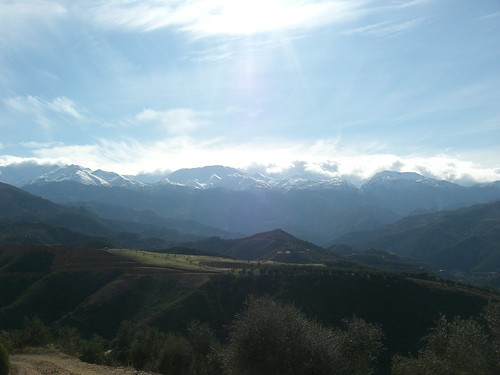
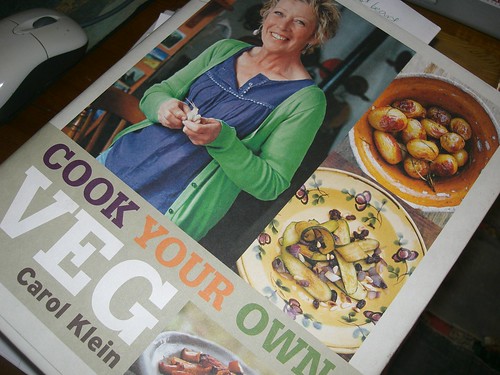

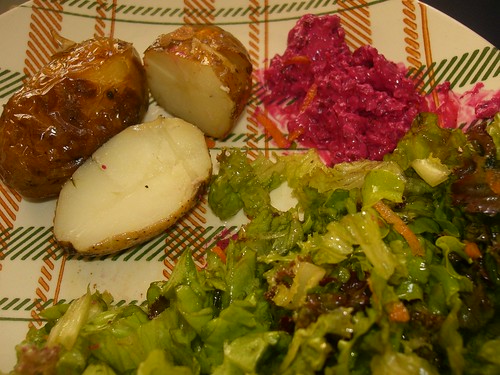
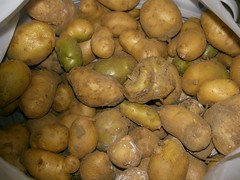
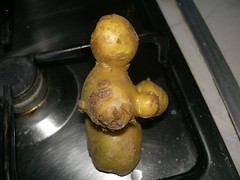
Another awesome article!
ReplyDeleteI once tried CANNED potatoes... simply because I had never seen them before. Just awful! Will never do that again...but these look just perfect :)
The French and the Swiss do a lot with baby potatoes! They look wonderful Maria, even at this hour of the morning. BTW you don't need special equipment to steam... if you put what you want to steam in a colander (metal) and place it on top of a pot with a couple of inches of water. Cover with the pot lid and boil gently...that will do the trick too!
ReplyDeleteCretan stamnagathi prepackaged at AB Vasilopoulos
ReplyDelete7.20 per kilo!!!Aaaaargh and no I didn't buy any!!!
The potatoes look delish Maria☺☺
When I was a kid the small new potatoes were my favourite. Mom would boil them with a little mint, add butter and salt and I could eat a plate full.
ReplyDeleteThey are delicious roasted, for sure, or BBQed. My mother roasted them once in the oven with lemon chicken and they were great! I don't buy them because they are more expensive (and we're in a potato-producing area so I can get cheaper ones), but now that I think about it they are on "buy one get one free" special...probably time to try them myself!
ReplyDeleteI love these little potatoes Maria, cooked several different ways. They are wonderful roasted in the oven as you've mentioned, and also delicious cooked with roast chicken. They also make a wonderful potato salad, skins and all! Hopefully they will become more popular where you live.
ReplyDeleteMy favorite photo has a high tech edge to it now, but this might make it even more magnificent (i'm not sure yet).
ReplyDeletethe potatoes look delicious Maria, london says hello!
ReplyDeleteAs a potato grower for the family needs I get two kinds of mini potatoes in a crop. The best ones are the fresh small potatoes we unearth early in season before they reach full size and they have really tender skin and I roast, boil in their skins. The other ones are the small potatoes we get when we harvest the crop and their skins are tougher. We usually consume them first because they sprout more easily. Nevertheless I still cook them in their skins, too lazy to peel them.
ReplyDeleteMaria, try growing your own. It's ever so easy. It takes 3 months from sowing to full harvest but from the 2nd month onwards you can harvest baby potatoes. You get 1 kilo of potatoes for every 100 grs you sow. When the frost is over, ie early March, dig up a hole, put some manure in it and place a small sprouted potato(100gr), cover and earth when the plant grows to 40-50cm. End of May you get a kilo of fresh potatoes. Preferably for best yield get seed potatoes for sowing and not just small potatoes that have sprouted. Or better still ask your uncle what potatoes he uses for sowing.